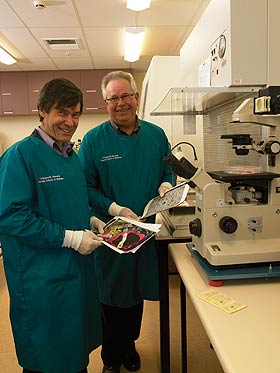
 Professor Mike Eccles and Associate Professor Tony Poole:
Professor Mike Eccles and Associate Professor Tony Poole:
Their collaboration is throwing light on the development of serious kidney disease.
It might seem like an odd combination – a geneticist, a former zoologist turned medical researcher and two flocks of sheep – but this collaboration is making important headway in understanding the role of miniscule, barely detectable cilia in the development of kidney fibrosis and several other conditions.
Professor Mike Eccles, a geneticist in the Department of Pathology, has a long-standing interest in the genetic basis of disease, particularly kidney disease, and several rare forms that affect children. In recent years he has been working with sheep that seem particularly prone to a genetic condition causing lamb fetuses to develop abnormally large kidneys full of cysts and fibrosis. Usually they are stillborn or die soon after birth.
We've mapped the gene involved in the disease and, together with that, we've more clearly defined what the actual disease is in the sheep and have correlated this with what we believe is the similar or homologue disease in humans," says Eccles.
That homologue disease, known as Meckel-Gruber Syndrome, is quite rare in humans. In the US it occurs in about one in 15,000, but in Finland and North Africa the rate is up to one in 3,000. People with the disease have massively enlarged, fibrotic kidneys and their prognosis is poor.
Meanwhile, Associate Professor Tony Poole came to Otago's Department of Medical and Surgical Sciences in 2002 to extend his research on primary cilia – tiny, aerial-like sensory probes on cells, including those that line kidney ducts. Discoveries about cilia have grown exponentially over the last decade and, Poole says, abnormal cilia are implicated in a broad range of conditions in the liver, pancreas and kidneys – including many cystic kidney diseases – as well as abnormalities in craniofacial bones and, probably, the central nervous system.
When Eccles told him about the lambs with extremely distended kidneys full of cysts and holes, Poole realised it was similar to the polycystic kidney disease he has been studying and knew there must be a link to cilia. It was the beginning of an important collaboration.
Mike and his team have identified the gene involved, where the mutation is in the gene and how that will affect protein. At the same time, I have been coming from the side of primary cilia, looking at how abnormal they are and what could be happening to cause this major disease."
Right through life cilia seem to play roles that are critical and fundamental, says Poole. They act as a sensory device during development and maturation, and then during maintenance.
They even play a part when cancer causes degeneration.
For example, developmentally the cilia play a role in making sure the kidney develops properly. Once it has developed, the cilia play a slightly different role, sensing urine flow and signalling downstream cells what to do."
Abnormal cilia can end up sending abnormal signals, causing problems such as the development of fibrosis, or they might produce another molecule that ends up being detrimental to the overall health of that organ and, perhaps, the whole animal.
Eccles has had a long interest in the genetic basis of disease, particularly kidney disease, and he also has a strong interest in the development of the foetus and the relationship of that to cancer.
I think this research has all those elements in it," he says. For me, it is a very interesting intersection between various fields of biology that I think are fundamental to understanding what's going on with this defect of the primary cilia and the disease that's caused in these animals."
The research has also involved major collaboration with the AgResearch team, headed by John McEwan, which has been involved in mapping the sheep genome.
Poole says the sheep model they have developed and their growing bio-bank of tissue samples will enable them to understand the basis of this disease to a very high degree.
We will be able to do a large number of interesting studies into the future and Mike is already starting to look at some aspects of the potential to treat these fetuses in utero to see if we can ameliorate the progression of the disease," he says. We also hope that this resource we are building up will act as a cornerstone for developing collaborations, both locally and internationally."
Funding
- University of Otago/AgResearch Collaborative Grant
- University of Otago Research Grant
- Otago Medical Research Foundation
- Kidney Health New Zealand
- University of Auckland
- The Maurice and Phyllis Paykel Trust
- University of Otago Research Theme